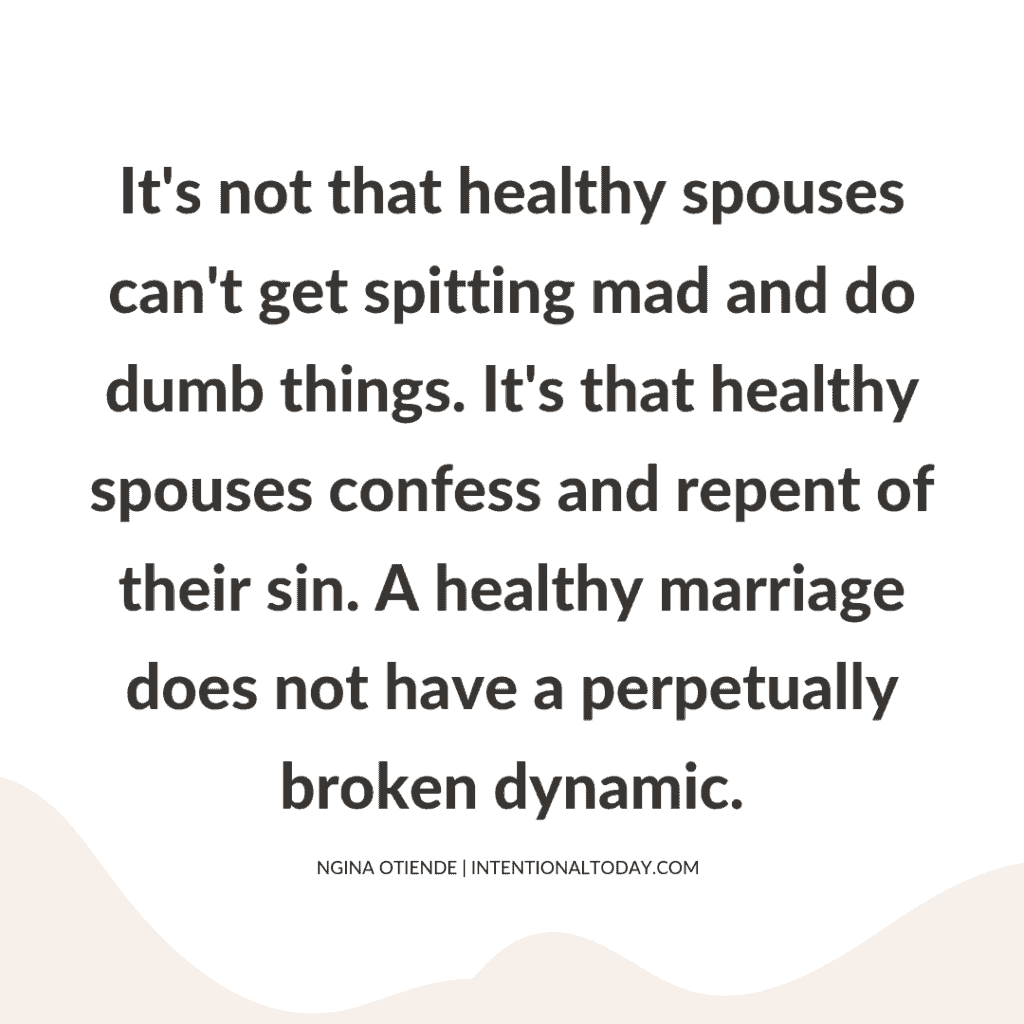What Everybody Ought to Know About Christian Teaching on Marriage
Good Christian teaching on marriage and bad teaching – what is the difference? And is unhealthy teaching easier to spread?
More definitions exist as to what constitutes bad teaching on Christian marriage. In today’s blog post, it refers to any teaching, e.g., articles, blog posts, books, courses, sermons, e.t.c, that can harm some or all of the audience.
This includes teaching that can benefit some marriages. For example, “Remember you’re a team: don’t give up on each other” is sensible advice when addressing healthy couples going through typical marriage problems. See Persevering in Marriage Through Difficult Seasons.
But when directed at individuals in toxic and abusive marriages, it’s deadly because the toxic or abusive spouse does not care for unity or oneness, just themselves.

One of the ways Christian marriage teachers (authors, pastors, bloggers, podcasters e.t.c) can avoid bad teaching is through clear teaching.
This clarity can be in the form of issuing appropriate cautions throughout their teachings, so readers or listeners are aware of the intended target of their message. (But hang on, we’ll talk about why this approach isn’t adequate either.)
Recently, someone asked me if issuing caveats (so people in abusive or toxic marriages know they are not the intended audience of a message) wouldn’t be exhausting.
The individual also wondered if some people are called to speak to healthy marriages only and others to unhealthy marriages. Like Paul being called to the Gentiles and Peter to the Jews kind of thing.
Their question was in response to my post on Why I’ve Deleted My Books, Courses, and Over 200 Blog Posts.
So today, let’s talk about Christian teaching on marriage and explore
- Whether it’s possible to write to both healthy and unhealthy marriages and why good marriage teaching is not “exhausting.”
- If some people are indeed called to speak to healthy marriages only, and others to unhealthy marriages.
1. Is a More Nuanced Approach To Christian Teaching On Marriage “Exhausting”?
I, too, once thought that issuing caveats in all my blog posts was exhausting.
I actually wrote a whole blog post about it, explaining some of the assumptions I made in my writing and why it was impossible to be specific every single time.
I no longer consider caveats on Christian teaching on marriage tiring or repetitive. I now believe the opposite: that writing in a way that is cognizant of the fact that a good portion of your listeners or readers is in highly problematic marriages is responsible.
But here’s the thing. It’s more than just issuing caveats in our Christian teaching on marriage.
It’s how we write (or speak or teach) about marriage, overall. The illustrations we use, the language we choose, how we agitate the problem, the conclusion we infer.
For example, a writer can issue a caveat at the beginning of her blog post that her article is meant for everyday marriage problems.
But then she goes on and writes about really unhealthy dynamics like throwing things, chronic silent treatment, etc. She puts those in the healthy marriage basket.
Indeed, healthy people can get spitting mad and do dumb things. Healthy men and women can wound each other deeply too. They can be immature. They can be proud.
But healthy individuals confess and repent of their sin, and they address unhealthy behavior.

So when marriage teachers and authors talk about bad behavior in a healthy marriage, they should also shoulder the burden of clarity: writing in such a way that negative behavior doesn’t get a pass. We call it out.
We make sure to add our clarifying thoughts to illustrations and anecdotes that feature healthy spouses teetering on abusive behavior. If a story is great but confusing, we leave it out all together.
Where It Gets Confusing
When a writer uses language that presents unhealthy behavior like yelling, throwing things, chronic silent treatment, moving out as a regular occurrence in a healthy marriage, when we write as if these issues are standard patterns in a healthy marriage, it becomes very confusing for the individual in a toxic marriage.
Yes, there was a caveat. But the illustrations and language used feel a lot like their everyday experience. So they try and apply some of what they read because it hits like something that they can try out.
Or they feel horrible because the advice doesn’t work for them, and they think something is wrong with THEM.
Writing in this sensitive and responsible way can feel painful at first.
I’ve been deleting tons of my blog posts and trying to update others, and it’s hard. But the more I’ve done it, the easier it has gotten. A new part of my brain is getting some exercise, and it’s getting more painless by the day. Still challenging but doable.
I loved how one commenter on Facebook explained this type of growth.
"Most self-growth (altering the way we think and act as a result of new knowledge and understanding) is painful and I believe there's a biological/physiological reason for that. Habitual choices (repetitive patterns) build strong neural networks. In the building of these networks, the brain does not automatically distinguish between healthy and unhealthy choices. When we go about altering who we are for the purposes of growth and maturation, we destroy unhealthy neural pathways building while healthy ones in their place. This is usually both a physically exhausting and mentally taxing enterprise." Facebook Commenter
When I think about these shifts that writers, coaches, speakers, pastors, e.t.c must make, Paul’s words to the church in Rome keep coming back to mind.
“So then let us pursue what makes for peace and for mutual upbuilding. Do not, for the sake of food, destroy the work of God. Everything is indeed clean, but it is wrong for anyone to make another stumble by what he eats. It is good not to eat meat or drink wine or do anything that causes your brother to stumble. The faith that you have, keep between yourself and God. Blessed is the one who has no reason to pass judgment on himself for what he approves.” Romans 14:19-22 ESV.
Paul is essentially saying (my paraphrase), “don’t let your permissions and freedoms become a stumbling block for others.”
If writing in a certain way will stumble someone else, and even if some people (healthy couples) will benefit, I must choose a higher road. I should be thinking about those who don’t share my lived experience, not just those who do.

2. Christian Teaching on Marriage: Are Some People Called To Healthy Marriages and Others To Unhealthy Marriages?
I do believe certain people are called to speak to specific groups of people.
Some people will have a particular burden, gift, skill, or training for a specific type of work. It’s essential and needed. So yes, some people will teach about healthy marriage stuff, and others will be specialized and work with abused individuals.
However, the body of Christ shouldn’t have silos. We are one body.
I love a quote by Desmond Tutu, recently shared by Thriving Forward. The late Archbishop said, “We need to stop just pulling people out of the river. We need to go upstream and find out why they are falling in.”
We ALL contribute.
Some people are downstream, pulling people out of the river, and others are upstream, trying to lessen the likelihood of others falling in.
Some people are directly supporting and helping individuals in highly problematic marriages, and others are working to make sure abuse, chronic neglect, and unrepentance are called out.
Every single effort counts. We move as one body with different parts.
It all counts – from being trauma aware to removing vocabulary that breeds confusion, calling out patriarchy in marriage, becoming better listeners, and abuse advocacy and trauma recovery coaching. We can all be working together for the glory of our God.
What do you think? How can we correct bad Christian teaching on marriage? How can we grow and do better? Let’s chat in the Comments!
Helpful Websites and Pages For Toxic, Abusive or Difficult Marriages
If you suspect your spouse is toxic, abusive or chronically problematic, if they are engaged in unrepentant sin (repentance comes with fruit!) please talk to a licensed counselor who is trained in relationship abuse and trauma. God loves you. You are valuable. Here are a few resources and websites to check out.
- Hope For Hurting Wives
- Flying Free with Natalie Hoffman
- Leslie Vernick
- Life Saving Divorce with Gretchen Baskerville
- To Love Honor and Vacuum with Sheila Gregoire
- Patrick Weaver Ministries
- Elisabeth Klein
- Sarah McDugal
- Strong Wives with Bonny Burns
- Call emergency hotline in your country. For stateside help, call the National Domestic Violence Hotline at 1-800-799-7233 (SAFE) or browse their website for free help
